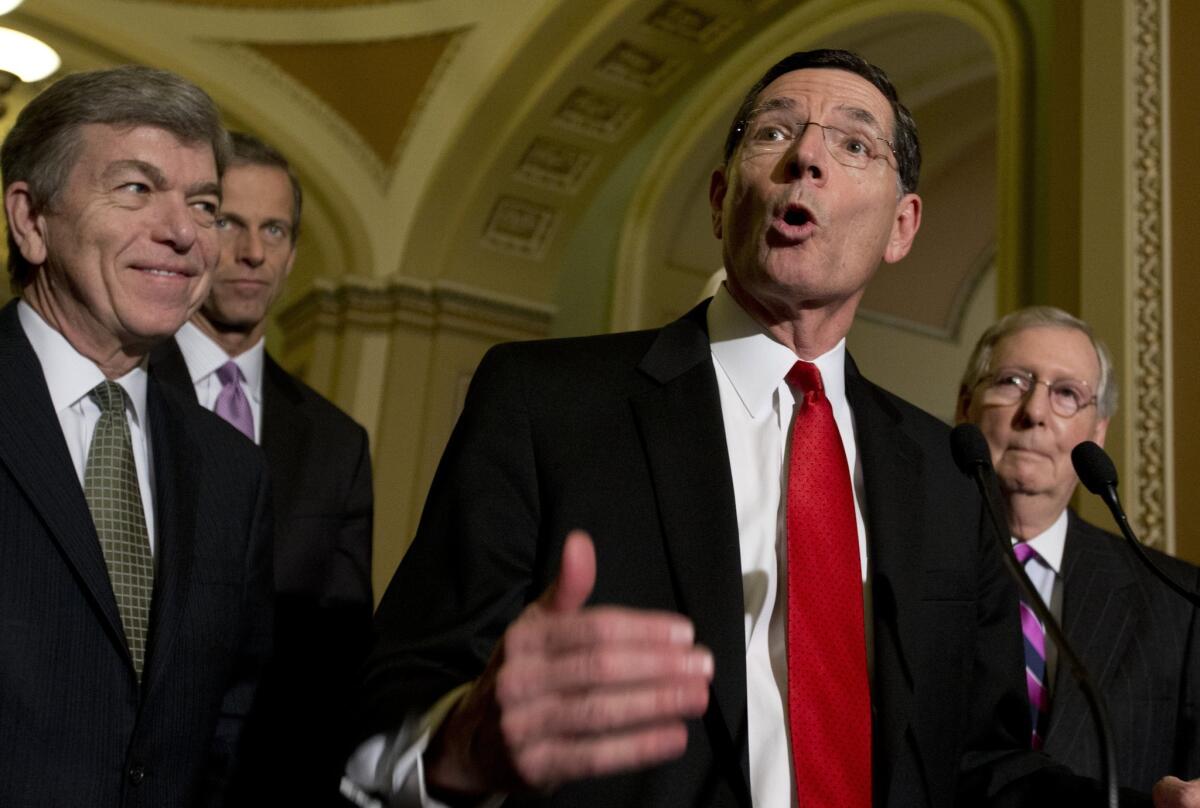The GOP keeps trying to scare people away from Obamacare--but why?

- Share via
The conservative approach to keeping Americans from taking advantage of the Affordable Care Act always has featured a large element of fear-mongering. Remember the “death panels”? Sticker shock?
That these things haven’t come true hasn’t kept congressional Republicans from conjuring up a new threat: that if the Supreme Court rules against Obamacare tax subsidies in the King vs. Burwell case, millions of Americans will face huge retroactive tax bills.
Judy Solomon, vice president for health policy at the Center on Budget and Policy Priorities, has taken a look at this argument. Her ruling: “That’s flatly incorrect.”
It is, however, part of a concerted GOP effort to discourage people from signing up for ACA health plans that might bring them affordable health coverage, often for the first time.
Here’s the background.
The plaintiffs in King vs. Burwell, who are a group of conservative ideologues opposed to the ACA, maintain that Congress intended through the act to bar tax subsidies for individuals who bought their health plans via the federal exchange, healthcare.gov, rather than exchanges set up by individual states. If they’re right, 5 million people in some three dozen states could lose tax subsidies that, on average, reduced their monthly insurance premiums to $82 to $346.
Most of the affected Americans are in working families without access to employer-sponsored plans. Removing subsidies that cover three-quarters of their premiums would make their insurance unaffordable.
There’s no evidence whatsoever that Congress intended this outcome, and plenty that the plaintiffs have seized on a mere wording glitch to argue that Congress meant to destroy its own healthcare reform. The IRS judged the glitch to have created an ambiguity in the law that it had the authority to resolve. It ruled that all those whose incomes qualified them for the subsidies (income less than 400% of the federal poverty line) would get them, regardless of how they signed up. The Supreme Court is expected to rule on that judgment this summer. Legal experts say that if the court applies conventional standards of statutory interpretation, the subsidies will stay.
Ever since the court agreed to take up the issue in November, Republicans in Congress have been demanding that federal officials warn Obamacare customers not only that they may lose their subsidies, but that they may lose them retroactively--and thus force them to pay huge bills for back taxes.
Rep. Jim Jordan, R-Ohio, harangued Marilyn Tavenner, administrator of the governments Center for Medicare and Medicaid Services, on this subject Dec. 9 during a hearing of the House Committee on Oversight and Government Reform. (This hearing is famous as the one in which Obamacare consultant Jonathan Gruber was raked over the coals for his ill-considered statements about the law; the Tavenner exchange starts at the 1:29 mark.)
“Do you think it’s responsible to not tell millions of enrollees,” Jordan hectored Tavenner, “that things may change dramatically and that they may have a tax liability and their premiums could increase as much as fourfold?”
Tavenner replied, correctly, that “this is not a closed case” and that nothing had changed for people signing up for coverage in advance of the court ruling.
Sen. John Barrasso, R-Wy., a sworn foe of Obamacare, followed up Dec. 17 with a letter to Treasury Secretary Jack Lew and Health and Human Services Secretary Sylvia Burwell demanding that they “inform all current federal exchange enrollees and all visitors to HealthCare.gov about the King suit and how a ruling against the administration could affect them.”
Barrasso adorned his letter with some typically fact-challenged attacks on the ACA--he called the tax subsidies “unambiguously inconsistent with the law,” which takes the issue out of the Supreme Court’s hands. He asserts that without the warning, “many families could turn down more-secure coverage options (e.g., through a different employer) in favor of less-secure Obamacare coverage.”
Barrasso’s views of the ACA never have been paragons of logic, but it’s hard to know what he’s talking about here. The whole point of the ACA is that it provides insurance for people who can’t find affordable plans anywhere else; is he suggesting that families deliberately sign up for more expensive insurance just because the ACA is under threat? Is he totally unaware that most ACA enrollees don’t have access to employer plans at all?
As the CBPP’s Solomon observes, “even if the Supreme Court ruled for the plaintiffs, people would not have to repay the premium credits they’ve already received.” That’s because “the Internal Revenue Code gives the Treasury Secretary discretion over whether to apply court decisions retroactively.” The chance that Lew would voluntarily apply a King ruling retroactively is nil. And, of course, the Court may well find the subsidies legal.
So what’s the goal of people like Rep. Jordan and Sen. Barrasso? It’s merely to scare people off from signing up for coverage that’s plainly in their interest. When you see elected officials like them urging people to “forgo health coverage, possibly jeopardizing their health or risking catastrophic medical costs,” as Solomon says, in anticipation of a ruling that may never happen, it raises the question of whose interest Jordan and Barrasso represent. It’s not their constituents’.
Keep up to date with the Economy Hub. Follow @hiltzikm on Twitter, see our Facebook page, or email [email protected].
More to Read
Inside the business of entertainment
The Wide Shot brings you news, analysis and insights on everything from streaming wars to production — and what it all means for the future.
You may occasionally receive promotional content from the Los Angeles Times.











